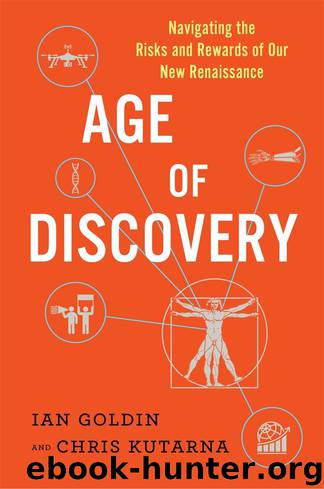Age of Discovery: Navigating the Risks and Rewards of Our New Renaissance by Ian Goldin & Chris Kutarna

Author:Ian Goldin & Chris Kutarna [Goldin, Ian]
Language: eng
Format: epub, mobi, azw3
Publisher: St. Martin's Press
Published: 2016-05-23T22:00:00+00:00
** In the meantime, to prevent repeats in the future, the US Postal Service has been irradiating all D.C. federal mail, at an annual cost to the US taxpayer of $10–$12 million per year.
Part III
Flourishing Risk
How the Present Age Generates Risk and Strains Society
7
The Pox Is Spreading, Venice Is Sinking
How the Age We’re In Magnifies Systemic Dangers and Makes It Harder to See Them Coming
The downside of linking up
In 1494, Ludovico Sforza, who for 13 years had controlled the Duchy of Milan from behind the throne as regent for his too-young nephew, stepped forward and seized the mantle of duke for himself. Alfonso II, the king of Naples (who himself had a claim to Milan), challenged the move and threatened to unseat this usurper. But Sforza was not without allies. Charles VIII, the powerful king of France, had a claim to the throne of Naples, and Sforza convinced Charles that now was the moment to press it.
Charles raised an army of 25,000–30,000 men—including 8,000 mercenaries drawn from all over Europe—to wage his Italian war.1 Passing unimpeded through Milan, his men slashed and burned their way down the rest of the Italian peninsula and captured Naples in February 1495.
But Charles had miscalculated. His show of brutality and overwhelming force, which brought swift victory, also accomplished what no lesser threat could: it united the states of Italy and their allies in fear against a foreign foe. The pope convened a Holy League to drive the French from Italy, and Venice, Spain, England, the Holy Roman Empire (very roughly, present-day Germany) and even Milan signed up. (Sforza had begun to fear that Charles would betray him and swallow his own duchy, too).
On July 6, 1495, the massed armies of the Holy League met Charles VIII on a rain-soaked field at the Battle of Fornovo to decide Italy’s fate—for the moment. The League had numbers on their side; Charles had the terrain. In less than two hours of fighting, the French lost 1,000 men; the League lost twice that many. Both sides claimed victory; neither pressed the other to continue. Charles retreated back to France, and his army scattered.2
But he left something behind.
Italian battlefield doctors noticed the disease first. It was unlike any affliction they had ever seen or that had ever been recorded, going back to the time of the Roman Emperor Marcus Aurelius and the medical treatises of his physician, Galen.
Plague was well known—its symptoms terrible, its consequences mercifully swift. The victims spat blood, and in three days they were dead. But this was something new, something crueler. It debilitated its victims in horrid ways and left them to linger through months, even years, of flesh-eating filth and disgust. A medical chronicler of the time described sufferers’ bodies “covered with acorn-sized boils that emitted a foul, dark green pus.”3 These boils often appeared first on the sex organs. Those who survived the disease’s first stages developed “tumors the size of bread rolls and ulcers that progressively, but simply dissolved skin.
Download
Age of Discovery: Navigating the Risks and Rewards of Our New Renaissance by Ian Goldin & Chris Kutarna.mobi
Age of Discovery: Navigating the Risks and Rewards of Our New Renaissance by Ian Goldin & Chris Kutarna.azw3
This site does not store any files on its server. We only index and link to content provided by other sites. Please contact the content providers to delete copyright contents if any and email us, we'll remove relevant links or contents immediately.
Learning SQL by Alan Beaulieu(6282)
Weapons of Math Destruction by Cathy O'Neil(6267)
Digital Minimalism by Cal Newport;(5750)
iGen by Jean M. Twenge(5409)
Sapiens by Yuval Noah Harari(5366)
The Age of Surveillance Capitalism by Shoshana Zuboff(4279)
Elon Musk by Ashlee Vance(4122)
Thing Explainer by Randall Munroe(3930)
Apollo 8 by Jeffrey Kluger(3705)
Future Crimes by Marc Goodman(3592)
The Science Book (Big Ideas Simply Explained) by DK(3277)
The Innovators: How a Group of Hackers, Geniuses, and Geeks Created the Digital Revolution by Walter Isaacson(3165)
Who Can You Trust? by Rachel Botsman(3129)
I Live in the Future & Here's How It Works by Nick Bilton(2994)
Infinite Energy Technologies by Finley Eversole(2975)
Steve Jobs by Walter Isaacson(2889)
Dawn of the New Everything by Jaron Lanier(2770)
Chernobyl by Serhii Plokhy(2536)
Ben Franklin's Almanac by Candace Fleming(2524)
